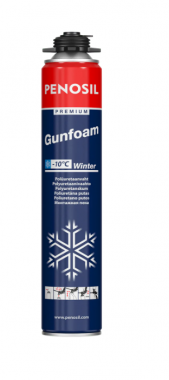
*The appearance of the product may differ from the image
PENOSIL Premium Gunfoam Winter Professional polyurethane foam for winter conditions
PRODUCT DESCRIPTION
Professional gun foam for winter conditions. Ideally suited for most sealing and filling jobs in construction.
------------------------------
ADVANTAGES
- Good thermal and sound insulation.
- Dense and uniform structure.
- Low post-expansion.
- Very good adhesion to various construction materials.
- High-quality results in different weather conditions.
- Application with a foam gun.
APPLICATION AREAS
- Installation and insulation of doors and windows in cold weather.
- Insulation and fixing of pipes.
- Filling of holes and gaps, joint insulation.
- Thermal and acoustic insulation.
SUITABLE SURFACES
- Wood
- Concrete
- Brickwork
- Brick
- Most metals
- Drywall
- Extruded polystyrene
- Roof tiles
PACKAGING
Aerosol can 1000 ml,
filling 750 ml,
12 cans per box
------------------------------
INSTRUCTIONS FOR USE
Hold the foam can in an upright position and attach/turn the gun while holding the gun handle with one hand and the can with the other. Make sure the gun is not pointed at people while you are turning it. Do not screw the can onto the gun with the valve upside down, and do not screw the gun onto the can. After attaching it to the gun, shake the can thoroughly at least 20 times and turn it to the application position. The foam output can be adjusted using the gun trigger.
------------------------------
TIPS
- A pre-moistened surface ensures faster foam curing and a better result.
- At low temperatures, the foam should be warmed before starting work. The temperature of the room or the water used for warming must not exceed +30 °C.
- Air temperature during application: from -10 °C to +30 °C, best results at +20 °C.
- Can temperature during application: from +5 °C to +25 °C, best results at +20 °C.
- Surfaces must be cleaned of dust, oil, and loose particles.
LIMITATIONS
- Cured foam is sensitive to ultraviolet radiation and must be covered.
- Do not use on surfaces that are in constant contact with water.
- Insulation foam does not adhere to polyethylene (PE), polytetrafluoroethylene (Teflon®), or silicone surfaces.




